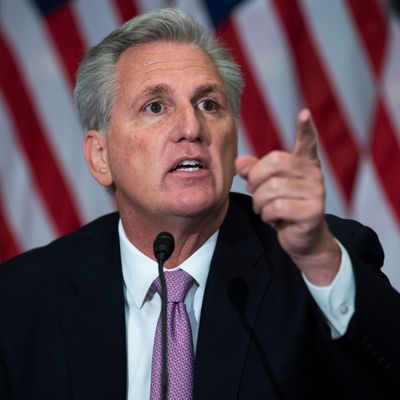
One of Donald Trump’s innovations as president was to attempt to personalize the relationship of the state to private firms. Executives who praised him would receive lavish displays of support and gain easy influence. On the other hand, he would openly sic the government on firms or owners who ran afoul of him — stripping a lucrative Pentagon contract from Amazon in retaliation for Jeff Bezos’s ownership of the Washington Post, or blocking a merger requested by CNN’s parent company to punish its coverage of the administration.
That practice lives on past Trump. On Tuesday, House Minority Leader Kevin McCarthy threatened telecommunications firms not to cooperate with subpoenas from the House committee investigating the January 6 insurrection. McCarthy, perhaps fearing that records will reveal more coordination between Congress and the White House or pro-Trump groups in advance of or during the riot, warned firms that if they cooperate, “a Republican majority will not forget.”
Marjorie Taylor Greene, appearing on Fox News, took McCarthy’s threat a step farther, proposing to shut down any firms that cooperate with the investigation. Tucker Carlson gave that idea his enthusiastic endorsement:
One might dismiss Greene as a harmless kook, but if she is getting airtime and a respectful hearing on the most highly rated political show on television, she is not harmless. A Republican House acting alone can’t shut down telecommunications firms, but it can harm their interests in all sorts of ways that could make them think twice about cooperating with an investigation, or taking any other political step that Republicans dislike.
Some conservative supporters of Trump have put a favorable gloss on his idiosyncratically anti-corporate stances, dressing them as “populism” inspired by his kinship with the common folk. But the truth is that Trump’s forays against corporations largely comported with a simple urge to bully and dominate using the power of the government as a club. Trump’s highly publicized attacks on Silicon Valley did not follow any theory about monopolies; they were mere instruments of political control.
One of the characteristics of Viktor Orbán’s Hungary, a nation many conservatives openly yearn to mimic, is the use of the state to bolster the ruling party. Companies know they will lose contracts or face sanctions if they take any action disfavored by Orbán. Trump was usually too inept to carry out his threats as effectively as his models like Orbán could. But as McCarthy shows, that aspect of Trump’s assault on liberal democracy will return the next time his party gains power.






























